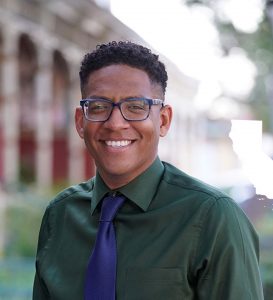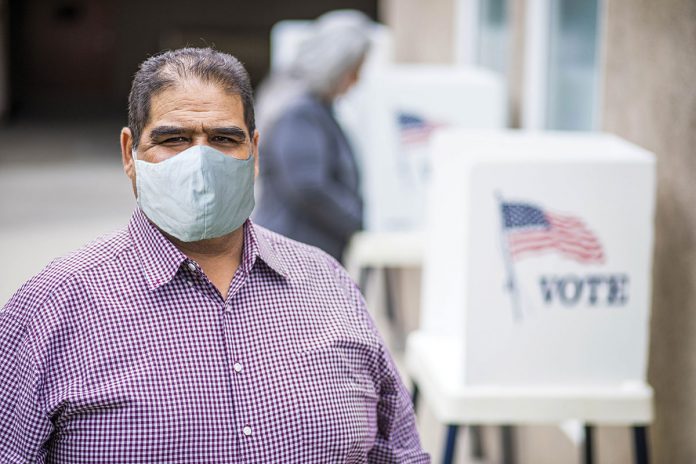Marcus Bush is 32, a father of two, a local who attended Sweetwater High School then San Diego State University before earning his M.A. in Real Estate Development. He says housing is the most important issue to address in his hometown of National City, followed by the environment and creating unionized jobs.
Professionally, he works as a housing project manager for a non-profit and serves on the city’s Housing Advisory committee.

In an authoritative tone, he says cost-prohibitive liability insurance factors into developers building rentals rather than townhomes for purchase, then questions how elected officials could provide developers with incentives to build townhomes.
“Honestly, getting homeownership raised is the biggest challenge. We’re at something like 70% renters and 30% homeowners— How do you turn it around so we’re at 50-50 or ideally 30% renters to 70% homeowners? We’re already built out but we need to build more condos and townhomes,” Bush said.
Long-term, he would like to see the city work on urban infill development to eliminate vacant lots and build out more accessory dwelling units like granny flats.
“Tiny homes and micro-units are good because they’re smaller than studios, better for young professionals and seniors,” Bush said.
Teachers are also struggling to afford homes, he says, and could benefit from affordable housing being built on school-owned land.
Bush says there is a larger connection between housing needs, urban development and local schools, such as improving sidewalks and building in progressive bikeways.
“The single car drop-off at schools creates more traffic… It’s important for us to have that conversation with the community, the ‘I know you don’t like this median but we’re trying to save kids when they walk or bike to school’ talk,” Bush said.
He favors public transit system improvements like increased trolley lines and the Blue express line running from National City straight to University of California San Diego so residents can commute to areas with better job prospects without adding another car to the road or having to foot the bill for gas and car expenditures.
Pragmatically, he says so much about reducing poverty is about increased access to better jobs.
He says “sometimes the city and school district operate in silos” and wants to see more partnerships developed between them.
He suggests local government partner with schools to teach young students about trade skills and labor agreements, while school districts can practice what they teach, “utilizing project labor agreements with local hire policies for construction projects to promote small, local businesses”.
Another partnership he’d like to see: the county of San Diego working with local municipalities to determine root causes of homelessness such as housing challenges and mental health care.
“I did a ridealong with police late last year and one thing they tell you is they’re taxed on responding to homeless and social service calls. We need to look at what we’re doing, where we’re overburdened, where we can reallocate for more efficiency.
Police accountability is important but we don’t need to apply what happens at the national level to National City,” Bush said.
At the same time, he said, the city still needs to answer to local police accountability; Bush believes that can be accomplished in part through training and community outreach like racial bias training offered by the Museum of Tolerance in Los Angeles.
In 2017, Bush filed a federal lawsuit to seek redress for what he claimed were retaliatory actions taken against him by then-Lemon Grove City Councilmember Jerrold Jones and Lemon Grove City Manager Lydia
Romero after he made a public comment on FaceBook social media application that was critical of Jones, implying the councilmember had “thinly-veiled racist tendencies”.
Both Jones and Romero later issued written apologies and the city of Lemon Grove paid $15,000 to cover attorneys’ fees and costs incurred by Bush, however he said the money was not the point.
“It wasn’t about a settlement agreement, it was about being able to speak up without retaliation,” Bush said.
He links race to social justice, cites his 2016 work opposing Measure A.
“National City would have gotten double the freeways. We have one of the highest poverty rates and 90% of residents are people of color so when you’re making the decision to give us double the highway lanes with potentially increased asthma rates and other health concerns, racial and social justice are linked,” Bush said.
A 360-degree turn has taken place since 2016, he says, from a push for more highway lanes to the Five Big Moves plan established by San Diego Association of Governments that focuses on transportation hubs and connected public transportation.
“What I tell my donors right up front is ‘these are my priorities and my vision’ and we’re not going to agree on every single issue but I hope you support the big picture of the housing crisis, environmental justice. I judge things based on the facts and research so if you have the facts, I’m open to that,” Bush said.















